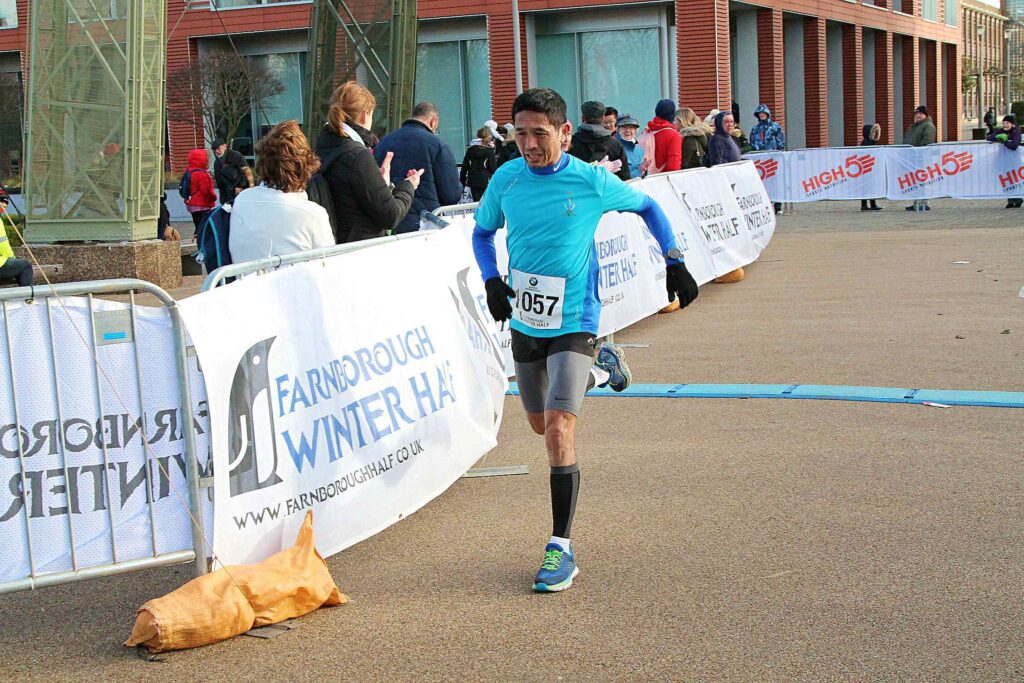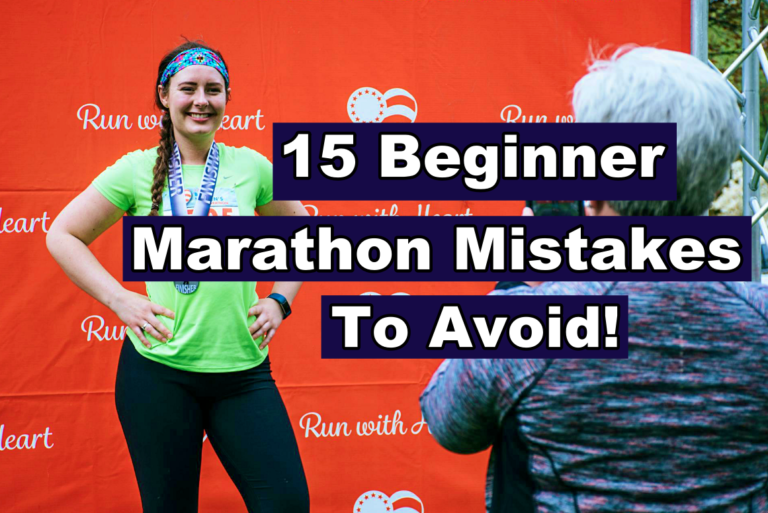Hey future marathoners! I am Shyam, a dedicated marathoner (personal best of 2:46), and I am excited to share my full marathon beginner training schedule. Whether you’re new to running or transitioning from park runs to a full marathon, I have you covered on how to get through those legendary 26.2 miles.
I will tell you this – if I went from a full-blown couch potato to running sub-3 marathons, you can destroy your first marathon! I have helped dozens of beginners complete their first marathon, and today I am sharing my best practices with you, including a free 12-week Marathon Training Plan.
Table of Contents
What is special about a marathon?
Participating in a marathon is likely one of the most demanding yet rewarding activities you can engage in. By the race’s finish line, you may experience a sense of invincibility that makes you believe anything is achievable.
There’s much to talk about when it comes to the length of a marathon. 26.2 miles (or 42.19 km) stemming from the story of Pheidippides who was a messenger said to have run 26 miles from Marathon to Athens and inspired the modern race we know today! Can you believe that an extra 0.2 miles were added during the 1908 London Olympics just to make sure the finish line would pass by the royal family?
What Does Marathon Training Feel Like?
Let’s face it – marathon training is difficult, but it’s a lot of fun. Here’s what you can expect:
- Your first few weeks will be rough but not uncontrollable.
- You’ll have good days and bad days (absolutely fine!)
- The speed at which your body will adjust will shock you.
- Your friends will probably grow bored of running chat (sorry, not sorry!)

Why Do Beginners Need a Training Plan?
Most injuries, setbacks, or loss of motivation arise when marathon journeys begin without a structured training plan. Training plans for beginners are important in developing endurance safely.
A good plan introduces running distances in manageable increments and includes rest and recovery days to allow your body to adapt.
What Is the Best Marathon Training Plan for Beginners?
A good marathon training plan for a beginner eases you in, allowing you to build stamina over time, focusing more on consistency rather than speed. Components that will make for a successful plan for beginners are highlighted below:
Ease into It
This said, you might want to focus on smaller goals before working on setting your eyes on full marathon training. To mentally and physically prepare yourself, you can think of starting with 5K or 10K races, followed by a half marathon, and ending with the marathon.
Pace Yourself
Don’t overdo it at first. Forget speed and distance for now; just jog lightly, walk briskly, or do whatever suits you in short, manageable sessions. A good starting point is running, or simply walking for approximately 30 minutes, four times a week. In this way, you work your way up gradually without getting burned out.
Duration, Not Distance
It is better to focus on the period you are on the run, especially during the first weeks. Now, focus on getting used to moving for long periods without thinking about the speeds. Try to run at a conversational pace, and meanwhile, build up your workout by reaching about 75% of your maximum heart rate.
Include Long Runs
Long Runs will help one build endurance and get the body adapted to the distances of the marathon. These sessions teach the body how to use energy more effectively and improve muscular endurance. Aim for at least one longer run per week, building up the distance over the weeks.
How Long Do You Need to Train for a Marathon?
This usually takes a minimum of 12 weeks to train for as a beginner. While seasoned runners sometimes do it in less time, 12 weeks is ample time for beginners to progress with the builds both in physical stamina and mental resilience.
A common characteristic of any 12-week program would be that it progresses with a gradual increase in your weekly mileage, tucking in those important rest days that are so necessary for the recovery and strengthening of muscles and joints.
The 12-Week Marathon Training Plan For Beginners!
Alright, now it’s time to dive into the details of your marathon training plan! This plan is tailor-made for beginners, with a focus on gradually increasing your endurance while avoiding any excessive strain on your body.
Take a look at the table provided below, and make sure to read the ‘Important Notes for Beginner Runners‘ right after it.
12-Week Marathon Training Plan
| Week | Monday | Tuesday | Wednesday | Thursday | Friday | Saturday | Sunday | Total |
|---|---|---|---|---|---|---|---|---|
| Week 1 | Rest | 3K-easy | 5k-2K easy, 1K faster, 2K easy | 5K easy | Cross Fit | Rest/Cross Fit | 8K run | 21K |
| Week 2 | Rest | 4K-easy | 5K-2K easy, 2K faster, 1K easy | 5K easy | Cross Fit | Rest/Cross Fit | 4-10K run | 24K |
| Week 3 | Rest | 5K easy | 5K-1K easy, 3K faster, 1K easy | 5K easy | Cross Fit | Rest/Cross Fit | 12K run | 27K |
| Week 4 | Rest | Easy 6K | 5K-Time yourself | 5K-Easy | Cross Fit | Rest/Cross Fit | 15K Run | 31K |
| Week 5 | Rest | 5K-easy | 6K tempo-3K of it at a faster pace | 5K easy | Cross Fit | Rest/Cross Fit | 20K run | 36K |
| Week 6 | Rest | 5K-easy | 6K-4K of it at a faster pace | 5K-easy | Cross Fit | Rest/Cross Fit | 22K run | 38K |
| Week 7 | Rest | 5K-easy | 8K at a steady pace | 5K easy | Cross Fit | Rest/Cross Fit | 25K run | 43K |
| Week 8 | Rest | 5K Easy | 8K-Steady pace | 5K easy | Cross Fit | Rest/Cross Fit | 30K run | 48K |
| Week 9 | Rest | 5K-easy | 8K-Steady | 5K easy | Cross Fit | Rest/Cross Fit | 30K run-steady pace | 48K |
| Week 10 | Rest | 5K-Easy | 8K-1K jog, 5K-Faster Pace, 2K jog cooldown | 5K-Easy | Cross Fit | Rest/Cross Fit | 20K run | 38K |
| Week 11 | Rest | 5K-Easy | 8K-Steady | 5K-easy | Cross Fit | Rest/Cross Fit | 15K run | 33K |
| Week 12: Rest, relax and taper for your marathon 🏃♂️ | ||||||||
Important Notes for Beginner Runners:
- Before starting the program, prepare yourself to run/walk a distance in the first week.
- The main purpose of the program is to run fast every week and run every week.
- Do not take your watch on the weekends. Cover the distance very easily.
- During the quickest days, run approximately 30 seconds per kilometre slower than your anticipated marathon pace during the “fastest” segment of your run.
- A long week of training is important. In the early stages of preparation, try to turn off the tension. Try to cover the faster once you get through the last five weeks.
- Try eating small meals that include fruits and vegetables. We lose a lot of water when running, so it’s important to stay hydrated throughout the day, especially before a long run.
- When running 20 km or more, keep a water bottle on the trail and drink water to stay hydrated.
Free 12-week Marathon Training Plan in PDF
You can check out my Free 12-week Marathon Training Plan for Beginners in a PDF version so that it is handy for you when you need it. (pdf-Google Drive).
Simple Breakdown of your 12-week Marathon Traning Plan:
- Week 1-4: Building Your Base
- Week 5-8: Building Endurance
- Week 9-12: Peak Training and Taper
Runner’s Words Definition of Terms:
Tempo Run:
Tempo Run is an exercise that simulates racing and is usually 3 to 10 km in length. It should be run at a pace that’s 15 to 30 seconds slower per kilometre than the race pace.
Interval Training:
Interval Training is designed to help you run faster. The intervals are short but run faster than the race pace. The rest of the time should be slowed down but the heart rate should not drop to the green zone. The rest period should be half of the time or distance you ran. An example of interval training is 4x800m with 400m jogging in between. Try to run a little faster than the race pace and try to run the last part as fast as the first time. Interval training is always challenging, but always rewarding.
Easy run:
An easy run should include running a little bit of long distance. Relax, take off your watch, listen to music, and get your heart rate up for the green zone.
Hill Reps:
Hill Reps training will make runners stronger. Sometimes you need to include this in your training. Remember that your overall run time will be slower on the day of your hill workout. On the hill, run faster than you would if you were jogging. Look straight ahead, not down at your feet. Lift your feet a little and drag your hands. Recover by jogging down the side of the mountain.
Recovery:
Recovery run is best done the day after a long workout, sprint, or speed workout. After a hard day of work on your legs, you only have one day off to recover.
Tapering
Remember to slow down before a race. Tapering means you need to reduce your mileage. Some runners like to rest the day before a race. Others prefer to take it easy with short, slow breaks.
Think like this, at least 10 days before the game, “money in the bank.” Prepare the entire week before the event.
Top Tip: “Easy” means you should be able to hold a conversation while running. If you can’t chat, you’re going too fast!
Essential Marathon Training Tips
Picking the Right Running Shoe
The right running shoes are important for training in your marathon. Now, deep dive into how to select an ideal pair designed to keep you pounding the pavement.
Know Your Foot Type
Before you rush out to grab that shiny new pair of running shoes, take a moment to think about what your feet need. A straightforward way to do this is by examining your current running shoes. The way they’ve worn down can reveal a lot about your foot’s requirements.
- Wear even across the soles? You likely have neutral feet.
- Wear mainly on the inner side? You’re probably an overpronator.
- Wear on the outer edges? You may be an underpronator.
What Shoe to Choose?
Knowing your foot type, you can begin selecting the proper footwear for yourself. Here is a quick guide:
- If you have a neutral foot: Invest in some stability shoes that will give you solid arch support.
- If you overpronate: Find motion-control shoes that offer you far better stability.
- If you underpronate: Cushioning shoes are what your feet are asking for.
Considerations for Shoes Made for Road Marathons
When it comes to training runs and marathon races that primarily take place on roads and pavements, it’s important to select shoes with specific features to support you during those lengthy distances. Here are the key aspects to consider when picking out your road running shoes.
- Breathability: Be sure to wear mesh uppers that will help keep your feet cool and reduce as much as possible the possibility of blisters on very long runs.
- Support Level: Make sure it matches your foot type and running stride; quite important for preventing injuries.
- Cushioning Balance: A shoe that provides adequate cushioning without removing the road feel from your feet.
- Weight: Lighter shoes are usually great on race day but also must have enough support for your requirements.
- Durability: Look for shoes that last at least 400-500 miles of training-end — and remember to track those miles!
It’s important to remember that choosing the right running shoes goes beyond just comfort; it’s also about reducing the risk of injury and enhancing your performance during both training and competitions.
Nutrition Basics
Proper fueling makes a massive difference. Here’s what works for most of the runners:
- Before runs: Light meal 2-3 hours before (toast with banana is perfect)
- During runs: Start fueling after 45 minutes (gels or energy drinks)
- After runs: Protein and carbs within 30 minutes (chocolate milk is brilliant!)
Common Mistakes to Avoid
Trust me, I’ve made all of these mistakes so you don’t have to:
- Starting too fast (the most common mistake!)
- Skipping rest days
- Not fueling properly
- Trying new things on race day
Race Day Strategy
After all your training, you want race day to go smoothly. Here’s my tried-and-tested approach:
The Week Before
- Stick to familiar foods
- Get plenty of sleep
- Prepare your kit early
- Study the route/course map
Race Morning
- Wake up early (3 hours before start time)
- Have your usual pre-run breakfast
- Arrive at least 1 hour before start time
- Do a light warm-up
During the Race
- Start slower than you think you should
- Stick to your fueling plan
- Break the race into chunks (I think of it as four 10K runs plus a Parkrun)
- Save some energy for the last 6 miles
Mental Preparation
The marathon is as much a mental challenge as a physical one. Here are my favourite mental strategies:
- Chunk it down: Don’t think about all 26.2 miles at once
- Use mantras: Mine is “strong and steady”
- Focus on form: When it gets tough, think about your running form
- Remember your ‘why’: Keep your motivation in mind
Recovery and Beyond
Congratulations, you’ve finished your marathon! But wait, there’s more:
Immediate Recovery
- Keep walking for at least 10 minutes
- Get warm and dry quickly
- Eat something within 30 minutes
- Celebrate! You’ve earned it!
The Week After
- Take at least 3-4 days completely off
- Start with light walking
- Get a massage if possible
- Start planning your next challenge!
Summary
Training for a marathon as a complete beginner may, at first be quite overwhelming; it is doable with the right mindset and good planning. A consistent running program with a mix of short runs, long runs, some form of cross-training, and rest days will position you for success.
Remember each run, each mile, and each rest day are part of the journey towards the finish line. Stick to your plan, listen to your body, and know you work for an incredible achievement. Best of luck with your marathon!
FAQs for Marathon Training Plan for Beginners:
What is the average marathon time for beginners?
Most beginners finish between 4:30 to 5:30 hours, running at about 10-12 minutes per mile.
What is a realistic training time for a marathon?
12-16 weeks (3-4 months) is perfect for most people. This gives you enough time to build up your distance safely. You can check out and try my 12-week Marathon Training Plan for Beginners.
What is the best age to run a marathon?
Runners usually peak between 30-35 years old, but you can run a marathon at any age if you’re healthy and well-trained.
Is 7 hours good for a marathon?
Yes! Finishing is what matters. Many races have a 6-7 hour cut-off time, so you’re in good company.
Can I run a marathon without training?
No way! It’s really dangerous and could cause serious injury. Always train properly.
Can I walk a marathon in 6 hours?
It’s tough – you’d need to walk fast (about 13:45 minutes per mile). Most walkers take 6.5-8 hours.
Will I lose weight if I run 40 miles a week?
Yes, probably! But remember to eat properly to fuel your runs.
Should you drink coffee before a marathon?
A small cup is okay if you’re used to it, but don’t try anything new on race day!
How many calories does a marathon burn?
About 2,500-3,000 calories for most people.
Are marathons good for weight loss?
Yes, but you need proper nutrition too. Training helps weight loss, but eating right is super important.
Is it better to run on a treadmill or outside for marathon training?
Outside is better because you get used to different weather and road conditions, but treadmills are good when the weather’s awful.
Is there a book I can read about marathon training tips?
Runner’s World Training Journal: A Daily Dose of Motivation, Training Tips & Running Wisdom for Every Kind of Runner, by Editors of Runner’s World Maga (Author)





[…] plan, like the beginner’s training plan, offers 4 training days per week, with 3 active recovery days. This means taking up other forms of […]